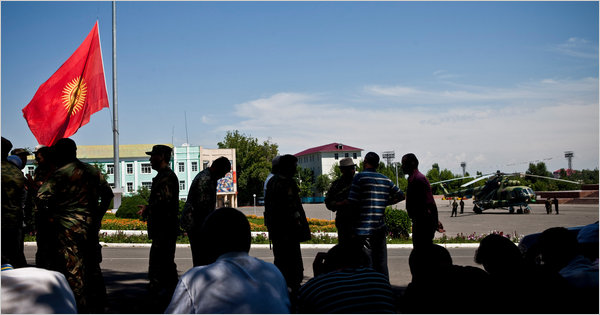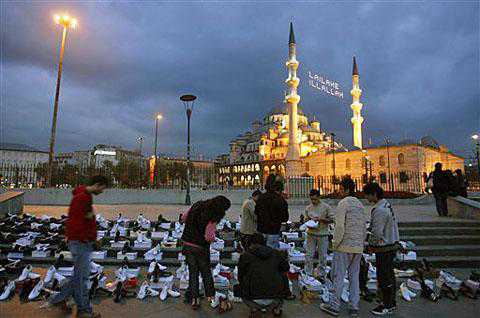Turkish-Azeri Deal May Herald New Competition in Southern Corridor
Publication: Eurasia Daily Monitor Volume: 7 Issue: 115
June 15, 2010
By: Saban Kardas
On the sidelines of the Conference on Interaction and Confidence Building Measures in Asia (CICA) summit held in Istanbul, Turkey and Azerbaijan concluded agreements on natural gas cooperation. On June 7, during a ceremony attended by Turkish Prime Minister, Tayyip Recep Erdogan, Azeri President, Ilham Aliyev, the Turkish Energy Minister, Taner Yildiz, and his Azeri counterpart, Natiq Aliyev, signed an agreement which will end a two year long price dispute on Turkey’s gas imports from the first phase of Azerbaijan’s offshore Shah Deniz-I, as well as setting the volume and price for Turkey’s imports from the second phase of the field, expected to come online in 2016-17. A related agreement will regulate the terms and mechanisms for the sale and transit of Azeri gas to Europe through Turkey.
Turkey currently imports 6 billion cubic meters (bcm) of gas from Shah Deniz-I, paying $120/thousand cubic meter (tcm), well below the current market prices. However, the original agreement allowed for price renegotiation, which is exactly what Azerbaijan asked for when the pricing terms expired in April 2008. As the negotiations were underway, Turkey continued to import gas, though stressing that it would compensate for the price differences retroactively. Despite several rounds of negotiations, which were eclipsed by the discussions on gas transit, the parties failed to bridge their differences, which also raised concerns in the West that the delays might undermine Nabucco and other projects seeking to ensure supply diversification from the Caspian basin to Europe (EDM, February 26). Moreover, the gas disagreements also aggravated the diplomatic row between Baku and Ankara, caused by Turkey’s efforts to normalize relations with Armenia, raising questions about future relations between the two fraternal countries (EDM, October 21, 2009).
Earlier, both parties announced that they had reached a breakthrough, and during Erdogan’s Baku visit in May, they expressed their determination to sign the deal in Istanbul (EDM, June 1). The recent deal, which apparently came about only after intense negotiations, signifies not only their willingness to reactivate the energy partnership, but also in repairing Turkish-Azeri strategic ties. As statements issued during Aliyev’s trip attest, Turkey will continue to place Baku at the center of its South Caucasus policy.
Still, energy is likely to remain the most important component of Turkish-Azeri ties. For instance, the Azeri State energy company SOCAR is already a major player in Turkey’s energy market, through its control of the country’s largest petrochemicals group PETKIM. Recently, it was announced that PETKIM would expand its operations through new multi-billion dollar investments in the coming years (www.azernews.az, June 3).
The exact details of the agreements have not been disclosed and some sources maintain that both parties still have to work towards elaborating many details. Yildiz declined to specify the revised price, indicating that it will be flexible in order to allow for adjustment to market conditions. Yildiz also added that it will be more favorable compared to what Turkey is currently paying to Russia (Anadolu Ajansi, June 8). However, Turkish media speculated that the price will be raised from $120 to $300/tcm. Turkey will have to pay around $1.5 to $2 billion to compensate for price differences. The price for Turkey’s imports from Shah Deniz-II, which will be around 6-7 bcm annually, is likely to be higher than $300 per tcm, and will be assessed by taking into account investment costs (www.haberturk.com, June 8).
The other major item, terms for the transit of further Azeri gas to Europe, was also settled. Ankara had been insisting on purchasing Azeri gas and then re-exporting it to Europe on its own terms, as was the case for Shah Deniz-I. Neither side clarified whether Turkey retained that right (Hurriyet Daily News, June 8), but Yildiz indicated that Turkey would be able to re-export the gas it imports from Azerbaijan in collaboration with PETKIM (Cihan, June 7). Some sources maintain that Azerbaijan will pay Turkey $45 per tcm in transit fees for its direct export to Europe, passing through Turkish territory (Sabah, June 8). There remains some uncertainty over who exactly will export Azeri gas to Europe, as Azeri sources failed to confirm that Turkey retains the re-exporting rights (www.enerjivadisi, June 9).
Previously, delays in negotiations with Turkey had invited the ire of Azerbaijan, because the development of the Shah Deniz-II had to be postponed. The resolution of the transit issue and the interest from different pipeline projects is definitely welcome news for Azeri officials, as they can now discuss with their European partners the commissioning of Shah Deniz-II. Both parties also publicized the agreement as a positive step that would facilitate other projects to transport gas to Europe, most notably Nabucco. Natiq Aliyev emphasized that they were willing to support Nabucco, but they still had not received any purchase commitment from Nabucco. Currently, Turkey is able to export Azeri gas to Greece through the Turkey-Greece Interconnector (TGI) which integrates Turkish and Greek grids. The planned Trans Adriatic Pipeline (TAP), which will run from Greece to Italy, also seeks to tap into Azeri gas.
Impending competition between Nabucco and other pipelines forming the EU’s Southern Corridor seems certain. While many believe Nabucco will be a non-starter without locking in Azeri gas, TAP has been awaiting the conclusion of the Turkish-Azeri negotiations.
Representatives from both TAP and Nabucco welcomed the Turkish-Azeri deal (www.today.az, June 8). Azeri officials, anticipating the country’s gas output to increase substantially in future, welcome such outside demand which will boost their export potential. However, as the initial phase of Shah Deniz-II might only have limited extra output after it was allocated for Azerbaijan, Georgia and Turkey, it remains to be seen if Azerbaijan can supply all the Southern-corridor pipelines simultaneously at their desired levels. Turkish media maintain that Italy might soon sign a transit agreement with Ankara and a supply commitment agreement with Baku, which will commit the entire remaining volume from Shah Deniz-II to TAP, leaving no extra capacity for Nabucco (Referans, June 9). Yildiz stated that Turkey supports both projects and the final decision will be taken by the Shah Deniz consortium (ANKA, June 9). In any case, the Turkish-Azeri agreement might herald new competition in the Southern Corridor.
https://jamestown.org/program/turkish-azeri-deal-may-herald-new-competition-in-southern-corridor/





 Yesterday’s announcement, made during a visit to Seoul by Abdullah Gul, the Turkish president, revived hopes of a South Korean win in the country after a first round of nuclear contracts was awarded to Russian companies last month. “The memorandum of understanding marks the first government-level understanding of the will to co-operate on it,” Yoon Sang-jik, the senior secretary for knowledge economy at the office of the South Korean president, told the state news agency Yonhap.
Yesterday’s announcement, made during a visit to Seoul by Abdullah Gul, the Turkish president, revived hopes of a South Korean win in the country after a first round of nuclear contracts was awarded to Russian companies last month. “The memorandum of understanding marks the first government-level understanding of the will to co-operate on it,” Yoon Sang-jik, the senior secretary for knowledge economy at the office of the South Korean president, told the state news agency Yonhap.


